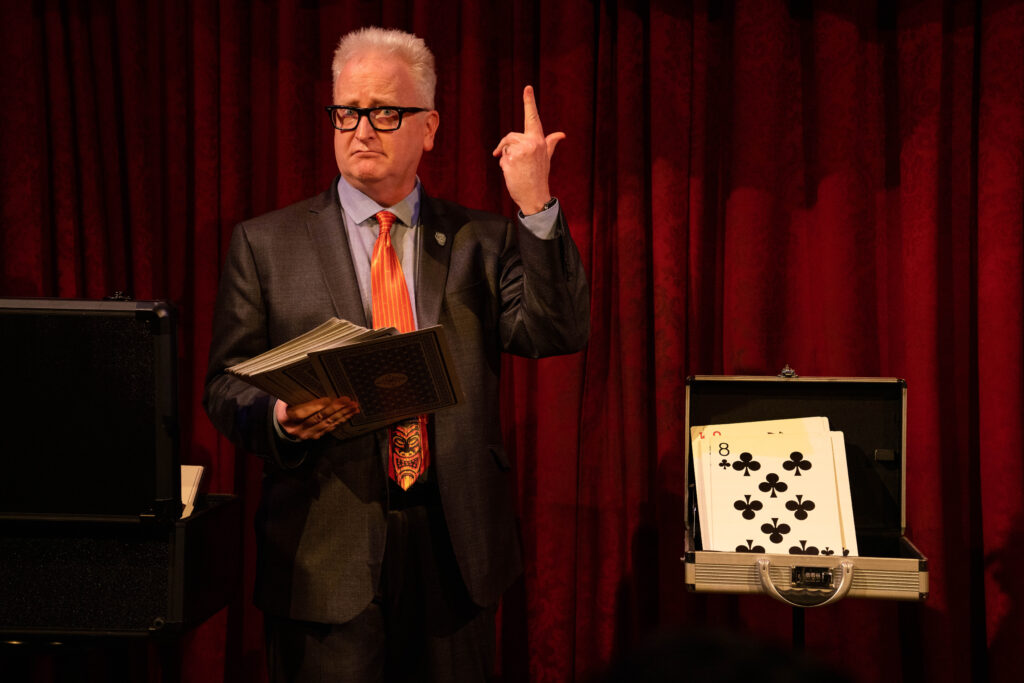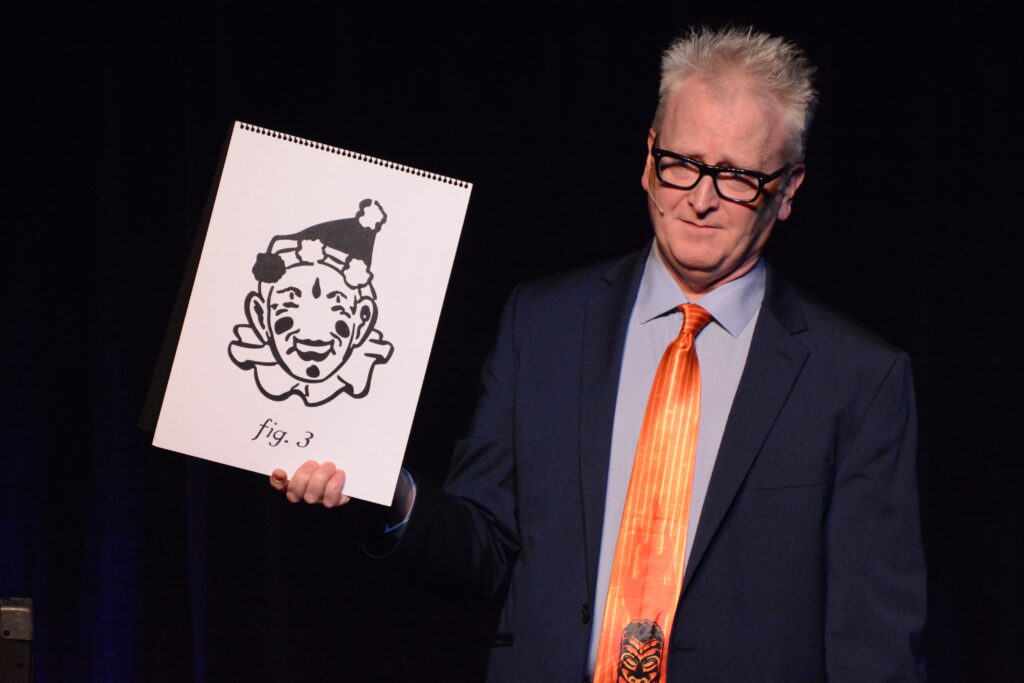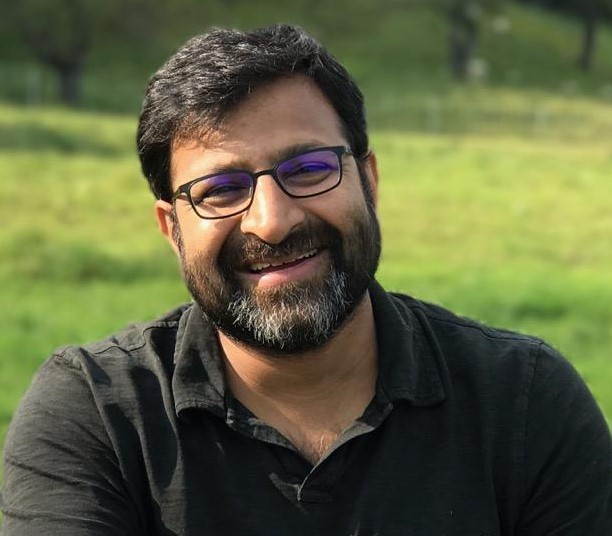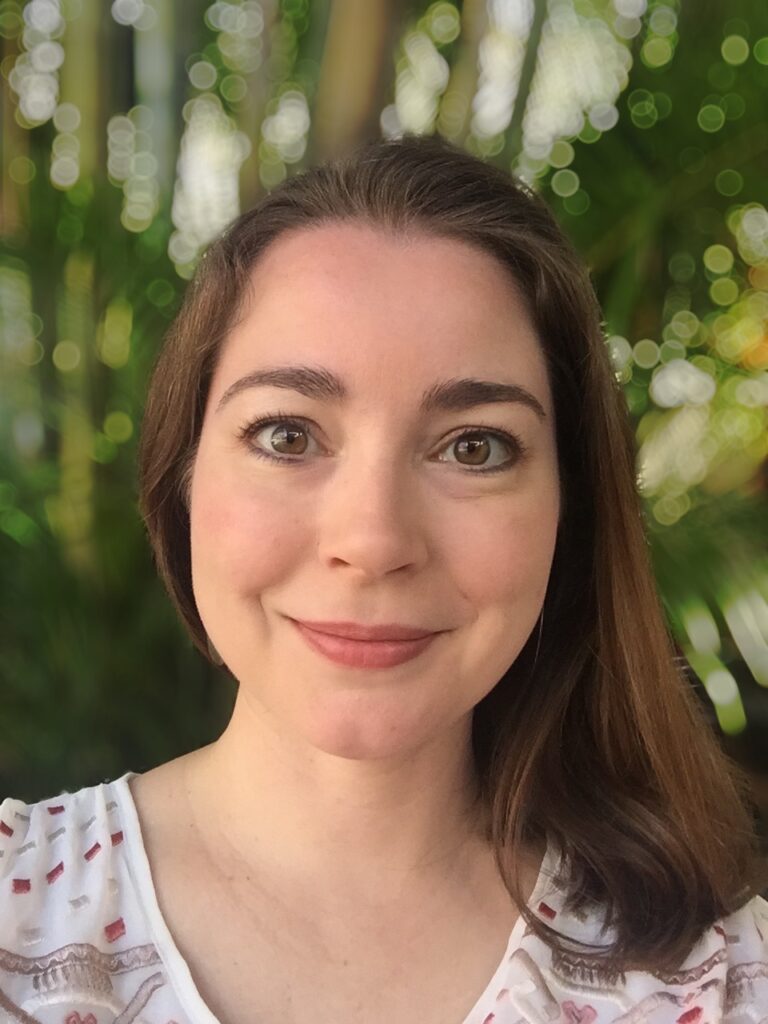Trio of Terrific Teachers Honored with Annual Emerson Awards
Three Emerson educators known for their unique teaching styles were honored by the 2023 Teaching Awards.
“We received a total of 725 nominations this year, which shows the degree to which excellence in teaching is recognized and appreciated,” said Jan Roberts-Breslin, interim provost.
Michael Bent ’85, a senior affiliated faculty member in Writing, Literature and Publishing (WLP) and Comedic Arts, was honored with the Alan L. Stanzler Award for Excellence in Teaching.
Marlboro Institute for Liberal Arts and Interdisciplinary Studies Associate Professor Amer Latif was honored with the Helaine and Stanley Miller Award for Outstanding Teaching.
Brenna McCormick, MA ’06, director of the Business of Creative Enterprises program, Strategic Marketing Communication (SMC) Graduate Program director, and Marketing Communication senior executive in residence, was honored with the Alumni Award for Teaching Innovation.
The three teachers received their awards at the Gold Key Society Induction Ceremony on Wednesday, April 5, in the Semel Theater.
The trio answered questions from Emerson Today:
Michael Bent ’85

Q: You were praised for “teaching in a way that is uplifting and fun” How do you accomplish this in, and out, of the classroom?
Bent: One of the very first thing I say at the beginning of the semester for every class is that if this class isn’t fun, then we’re doing it wrong. I really try to create a fun environment that isn’t at all competitive. I want everyone to help everyone else to shine, to bring out the best in people, to help them find their voice and realize their potential.
A lot of people think it’s cool for comedy writers to be sardonic or cynical, but I totally disagree with that. Some of my favorite moments in life are being in a room with comedian friends, working on material and making each other laugh. I feel that a sense of fun and play can ignite the spark that’s needed to create great comedy.
Q: What does it mean to you to receive the Alan L. Stanzler Award for Excellence in Teaching?
Bent: It’s such a great honor, all the more so because it’s student-nominated. It means so much to me that students feel that I helped and inspired them, because they never fail to inspire me. It’s also really nice to think that the Stanzler family created an award to honor a loved one and celebrate affiliated faculty.

Q: Considering you teach comedy, what’s funny about winning this award?
Bent: It’s funny because I never expected it. Unfortunately, comedy isn’t always taken seriously out in the world, it’s dismissed as frivolous and thought of as unimportant. But Emerson takes it very seriously with comedy classes in Writing, Literature and Publishing, the Comedic Arts major, the archives, ComEx, and the enormous amount of comedy troupes, stand-up shows, and other performances that happen on a daily basis. At Emerson, comedians are the “cool kids,” and it’s funny, because I never think of myself as cool.
Q: What did you think when you learned you won the award?
Bent: I had no idea that I was even in the running. I got the email and when I saw that it was cc-ed to a lot of people, I just skimmed it over and thought, “Gee, that’s nice someone won an award.” Then I moved onto the next email. It wasn’t until later that I took a second glance and I realized the winner was me!
Q: Is there anything else you’d like to share about winning the award, your work, teaching at Emerson, et cetera?
Bent: For so many years, I really was one of the only people teaching specifically comedy at Emerson. I just came in, did my thing and went home. But now, it’s so nice to be working with such a talented and supportive team with different expertise that bring so many diverse voices to the table. I’ve also been so fortunate to have worked with so many talented students over the years and see them go on to be movers and shakers in the entertainment industry. I’m honored that they let me be a part of their journey.
Bent teaches and has taught classes including: Why Did The Chicken? Fundamentals in Comedic Storytelling; Comedy Writing: Stand Up; Comedy Writing for Late Night; Comedy Writing: Sketch Troupe.
Amer Latif

Q: What does it mean to you to receive the Helaine and Stanley Miller Award for Outstanding Teaching?
Latif: I’m thrilled, quite naturally, but this individual thrill pales in comparison with the joy of recognizing this award as a sign of success of the 2020 merger that joined Marlboro College to Emerson.
The way I see it, when Marlboro College professors joined the Emerson faculty, we were able to preserve and create a new home for more than 400 combined years of a unique pedagogical experience in American higher education. I and my colleagues spent long years at Marlboro College supporting students creating their individualized courses of education. A version of this educational vision has been preserved in the creation of the new [Interdisciplinary Studies] (IDS) major at the Marlboro Institute at Emerson.
So this award says that the Emerson community has embraced Marlboro College faculty and what we have brought is valued and appreciated as a part of Emerson. This brings me a lot of joy.
Q: You were praised for “creating a wonderful learning environment where everybody is motivated to contribute and engage.” How do you create that environment?
Latif: “Teach less better,” and its counterpart for writing, “deleting is writing too,” have emerged as important principles for my pedagogy. At the beginning of my teaching career, I used to worry about whether I had not included enough material in my courses. Now I worry about whether I have assigned too much for students to read. It kept getting clearer to me that teaching is primarily about removing obstacles and creating just the right amount of structure and content. The goal is to allow everyone’s natural curiosity to flow and for the innate pleasure of learning to take hold.
More practically, I have found that a more engaging learning experience requires slowing down. To this end, I ask students to write notes by hand in a commonplace book for most assignments. Sometimes we hum at the start of class so we can hear everyone’s voice together and warm up our speaking muscles. We also do a short meditation at the beginning of class to ground ourselves in the present, to make silence together, and to become comfortable with silence. Just as our breathing is punctuated by moments of rest between exhaling breath and inhaling breath, a conversation needs good silence where we can ponder what we have heard and attend, without pressure, to our responses.
Another aspect, I think, is that I ask students to apply at least one idea from every reading to something practical in the world, something of importance to them. So, ideally, they come to class already having completed one iteration of the cycle of learning — engage with an idea, understand it, then express it in your own words and, finally, apply it to a context other than the one in which you encountered it. It is the same method I use for myself as a learner and I share my own handwritten notes in this format with them so they can see the power and potential of this simple iterative process.
Q: What did you think when you learned you won the award?
Latif: Well, the news was a total surprise. I’m on a research leave this semester and haven’t been on campus since December. So, it felt wonderful to know that members of the Emerson community had held me in their thoughts even while I was away.
I also felt immense gratitude for my friends and colleagues at the Marlboro Institute for Liberal Arts, in particular, the colleagues with whom I commute to Boston. The two-and-a-half-hour ride from Vermont is the most supportive and fun atmosphere I could ask for — all of my commuting companions have listened with patience, curiosity, and good humor to my ongoing (perhaps relentless!) thoughts about emerging ideas and pedagogical experiments.
Latif has taught and teaches classes including: Topics in Religion: Living in a Broken World; Advanced Topics in Religion: The Practice of Emptiness; Topics in Religion: Is The World Made of Stories?.
Brenna McCormick, MA ’07

Q: What does it mean to you to win the Alumni Award for Teaching Innovation?
McCormick: I’m humbled and honored. It makes me reflect on my own teaching journey, which has taken place here at Emerson, beginning when I was a graduate student in the Integrated Marketing Communication (now SMC) program. The award feels like a reflection of everything I’ve learned in my time here.
From being a student, watching the faculty teach, and being engaged with what they taught, to then being hired as affiliate faculty to teach those classes. That is when I fell in love with teaching. So, when a full-time opportunity with the Business of Creative Enterprises program opened in 2016, there wasn’t a question in my mind – I knew that was what I wanted to do. But the deeper I went the more I wanted to learn and improve. I am still learning. From my colleagues, from my students, and from my mentors.
Q: You were praised for your innovative approaches to the classroom experience – how do you teach innovation?
McCormick: The first class that I taught, going back to 2009, was Creative Thinking and Problem Solving, and which I am still teaching–this semester in fact! It is a non-traditional class, which I teach from a place of passion for the material and from my own experience being a practitioner. Just as I ask my students to dive deep into understanding their own creative process and use tools to expand it, I, too, practice the material. To know your own process requires reflection, and that is one of the core elements of all of my courses.
For instance, in my course, Creative Collaboration, the students are challenged with different kinds of team projects throughout the semester. They sometimes say, ‘I don’t know how to do X.’ But it isn’t really about X, it’s about the approach and collaborative process. Are you inviting other people’s ideas in? Are you leading and supporting your teammates? How are you communicating what you need? This style of teaching is my happy zone.
The way that I learned to teach from Creative Thinking is embedded in all my courses. Whether I am teaching Marketing the Creative Enterprise, or Introduction to the Creative Economy — it’s traditional content, but paired with activities, exercises and projects that take students further into a knowledge of their own skillset.
Q: You were also praised for your “empathy and passion” – how do you use empathy and passion in your teaching?
McCormick: I think that part of it is just who I am as a person. To me, the most important thing is to meet each other in the classroom. If you can’t meet each other, then there isn’t space for learning to flourish.
The other part of this that I would like to acknowledge is that my experience teaching, and learning to teach, has been shaped by two things: Being in a new program, and the pandemic.
When I joined the BCE, the curriculum was created, but the courses had not yet been fully built. I created the course content for the first time, and I learned and experimented and made adjustments as my students learned the material. Then I did it again, with more tweaks and experiments and adjustments. And again. And always with curiosity about how I could do it better.
Also, teaching during and through the pandemic had a huge impact on me. Everyone’s lives were strangely paused, disrupted, restructured, and without boundaries. I would be teaching on Zoom, and my then-toddler would come in and want to say hi to the class or ask for a snack. My students were back in their high school bedrooms with their pets. It was bizarre and crazy and all of us were going through it at the same time.
In both of these situations, you have to be vulnerable. You have to be flexible. A sense of humor also helps. I believe that kindness–for others, for myself, for the situation–is the best way to navigate the new or unexpected.
Q: How has becoming the Director of Business of Creative Enterprises made you a better educator?
McCormick: This is the thing I’ve been thinking about the most since I learned about winning the award. I learned how to teach at Emerson. Now I’m in this amazing role where I am sharing my knowledge with others. The BCE faculty are phenomenal. We have great communication, we exchange teaching strategies, as well as coordinate on how we are designing our courses, and we all bring different perspectives and experiences to our teaching.
What I love about the director role, is that I’m thinking about what students are learning in the classroom, and taking it one level out into a big picture view I have for the program. I think about what experiences students can have outside the classroom that enhance or shed new light on material or ideas that may relate back to their classes.
This past week, I coordinated a field trip to Jack Morton Worldwide and opened it up to grads and undergrads across both my SMC and BCE programs, as well as the department of Marketing Communication, [Public Relations], and other programs. Forty-five students and faculty came. We filled up the entire Jack Morton event space. It was an amazing turn out. But what I loved the most is that the students also got to meet each other. That’s really powerful because undergrad and graduate students don’t always cross paths. There’s something special about bringing people together in non curricular experiences that I think is very important to the learning experience.
Q: What did you think when you learned you won the award?
McCormick: I had just gotten back from the Jack Morton field trip. I was alone in my office, doing a last check of email before I went home. I was just speechless and joyful, and really, really moved.
It’s a long journey practicing the craft of teaching. It’s so vulnerable, to do that semester after semester during all these crazy things the last few years, while also leading from a place of empathy. You have to hold the space, and in that space, there is this sharing of knowledge and it’s a sharing of self. The award makes me want to pause, celebrate and reflect on my journey even more deeply. It feels empowering to see my own growth, to inspire others on their journeys, and to be recognized for doing this amazing thing that I love to do.
McCormick’s core courses in the BCE and SMC programs include: Creative Thinking and Problem Solving; Creative Collaboration for Marketing; and Marketing the Creative Enterprise.
Categories